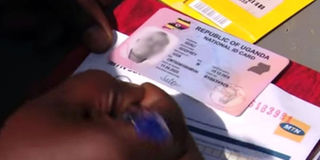NIN verification call unrealistic

What you need to know:
- Going forward, telecom regulators and operators as well as other sectors should embrace a system-wide approach to designing and implementing interventions and reforms aimed at improving service delivery.
Ugandans have taken to social media platforms to protest or comment about the recent MTN message requesting them to physically go to the nearby service centre or MTN duuka to verify all numbers linked to their national identification number (NIN). According to MTN officials, this is a new regulatory requirement/directive issued by the Uganda Communications Commission. It involves biometric capturing of details and thus the need to appear in person. They further warn that failure to heed this request by April 14 means that numbers will be disconnected. However, some concerned Ugandans are questioning whether this directive applies to only MTN or they are yet to get similar messages from other telecoms?
As Ugandan Diaspora, such impromptu directives make me question whether the regulators and operators will ever embrace a system-wide approach of thinking through the feasibility, consequences and implications of their directives? For example, how does a Ugandan living abroad, but still uses his/her MTN line to transact business such as receive mobile money from their business or maintain contact with their family and friends via WhatsApp adhere to the directive to go to the nearby MTN service centre or duuka to verify their details?
Do such directives imply that Ugandans in the Diaspora cease to be Ugandan and as such are never considered when introducing such reforms?
Not so long ago, many Ugandans were put under pressure to get their SIM cards registered. We witnessed queues as the deadlines ticked. This was followed by extensions and legal challenges to the process. Given that the major intention for which this exercise was undertaken was to curb crime in Uganda, many embraced it.
Despite the efforts, phone-related crimes such as people plucking off car number plates, kidnaps, and demanding for ransoms are still thriving. As to how the fate of Ugandans in the Diaspora was resolved during this process, remains to be answered. Were all the numbers for Diaspora Ugandans disconnected over failure to appear in person to register their SIM cards? What lessons did the regulators and telecom operators learn from this exercise? For this new directive, I have argued that since the operators captured details of Ugandans during the SIM card registration, the new verification requirement should utilise the existing details in the operators database and confirm whether all the numbers under a person’s name have similar NINs, passport number/identity card details. Rather than inconvenience people by urging them to appear in person again, telecom operators should instead generate spreadsheets with such details and verify them. It may save many Ugandans their precious time, avoid stressing those who cannot and will not meet the April 14 deadline.
Going forward, telecom regulators and operators as well as other sectors should embrace a system-wide approach to designing and implementing interventions and reforms aimed at improving service delivery. For example, if the NIN is going to be the new basis for verifying authenticity of ownership and eligibility of a person’s access to services, each Ugandan should be issued with one at the time of birth or becoming a Ugandan. This will ensure that a person’s records will bear that unique number/identifier across all other sectors.
David R. Walugembe,
[email protected]




